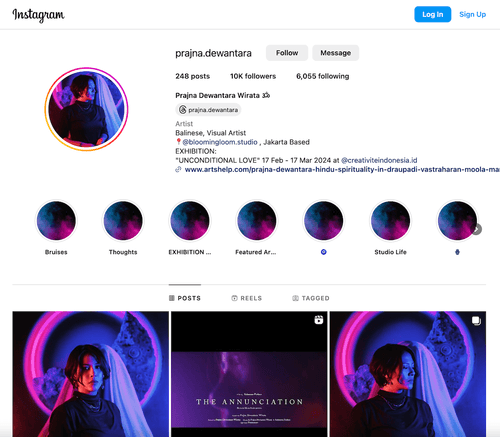
Trigger warning: sexual assault and depression
Prajna Dewantara Wirata, a Balinese artist now based in Jakarta, uses her art to navigate personal struggles and contribute to a larger conversation about healing and empowerment. Growing up surrounded by art and having a family of painters and designers, Prajna's path seemed preordained. However, her journey has been one of resilience and transformation, marked by personal challenges and a deep commitment to using art as a tool for self-expression and social commentary.
Inspired by literary figures like Oscar Wilde's Dorian Gray and the works of old masters like Caravaggio, Prajna views art as a powerful force that can shape lives and inspire change. 'I wanted to become a painter who contributes impactful artwork to society,' she shares. This desire led her to pursue fine arts at Institut Teknologi Bandung (ITB), a decision that coincided with a difficult period in her life.
Facing assault and harassment, Prajna found solace and strength in art. 'Art was a tool for me to survive, speak up, and tell the story I couldn't communicate, like a visual diary,' she explains. Drawing inspiration from artists like Caravaggio, who explored themes of darkness and spirituality, Prajna developed her own visual language that juxtaposes the beauty and vibrancy of colours with the underlying pain and trauma she has experienced.
'Even though darkness shrouds my life, I want to depict beauty in my art,' she says. This duality is evident in her paintings, where vibrant peacock hues, inspired by her Balinese heritage and spiritual beliefs, create a visual metaphor for hidden wounds and the process of healing.
Prajna's art is not solely about personal catharsis; it also connects her with others and contributes to a more significant dialogue about social issues. 'As a painter, I feel blessed to have the ability to add colour to life, not only in mine but also in others,' she reflects. This sense of responsibility drives her to engage with themes of gender, religion, and cultural identity, using her art to spark conversations and challenge societal norms.
Her experiences in Aceh, where she participated in an anti-violence against women campaign and exhibition, were particularly transformative. The uncensored discussions and the opportunity to connect with other artists and activists empowered her to speak out about her own experiences with sexual harassment and cultural violence.
'This process was healing for me,' she shares. 'Joining these causes and being part of these communities reminded me that I don't need to endure my pain alone.' This realisation solidified her belief in the power of art to create safe spaces for dialogue and healing, fostering a sense of community and collective empowerment.
—
Want to learn more about Prajna's artistic journey, her exploration of different mediums, and her vision for the future? Read the full interview in GROUNDING, the 4th volume of INTERLUNAR's zine.